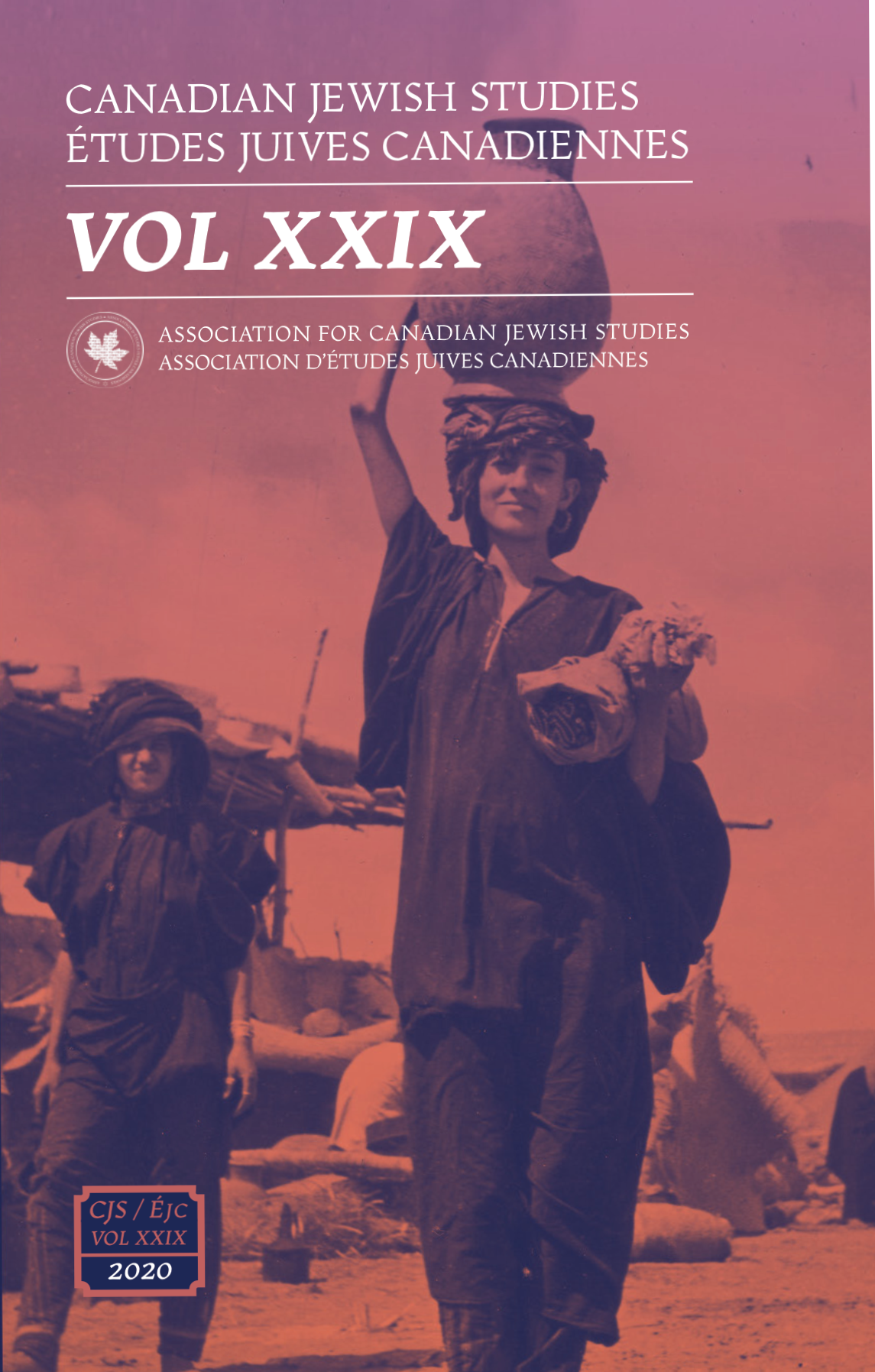Becoming Canadian: Folk Literary Innovation in the Memoirs of Yiddish-Speaking Immigrants to Canada
DOI :
https://doi.org/10.25071/1916-0925.40165Mots-clés :
littérature yiddish, immigrationRésumé
Dans le présent article, nous explorerons la créativité avec laquelle les immigrants yiddishophones ont adapté au contexte canadien le folklore qu’ils ont appris dans l’« ancien monde », créant, de ce fait, un folklore hybride, ainsi que de nouvelles identités. À cette fin, nous examinerons les textes autobiographiques de trois individus qui ont immigré au pays entre 1900 et 1930, à savoir les Gezamelte Shriften (OEuvres complètes) de J. J. Goodman (Winnipeg, 1919), Oksn un Motorn (Les boeufs et les tracteurs) de Michael Usiskin (Toronto, 1945) et Oyf Fremder Erd (En sol étranger) de Falek Zolf (Winnipeg, 1945). Nous défendrons la thèse suivant laquelle ces récits offrent d’importantes pistes pour comprendre la contribution de la première vague d’immigrants juifs d’Europe orientale à la création et l’expression de la culture judéo-canadienne est-européenne.
Références
Haya Bar-Itzhak, Israeli Folk Narratives: Settlement, Immigration, Ethnicity (Detroit: Wayne State University Press, 2005).
Charles L. Briggs, "What We Should Have Learned from Américo Paredes: The Politics of Communicability and the Making of Folkloristics," Journal of American Folklore 125, no. 1 (2012). https://doi.org/10.5406/jamerfolk.125.495.0091
Charles L. Briggs, Competence in Performance: The Creativity of Tradition in Mexicano Verbal Art, University of Pennsylvania Press Conduct and Communication Series (Philadelphia: University of Pennsylvania Press, 1988).
Jocelyn Cohen and Daniel Soyer (eds.) My Future Is in America: Autobiographies of Eastern European Jewish Immigrants (New York: New York University Press, 2005).
Greg Dening, "Possessing Tahiti," Archaeology in Oceania 21, no. 1 (1986). https://doi.org/10.1002/j.1834-4453.1986.tb00130.x
Robert A. Georges, "Research Perspectives in Ethnic Folklore Studies," Jerusalem Studies in Jewish Folklore 4 (1983).
Y. Gershman, "Forvort," in Oksn un Motorn, by Michael Usiskin (Toronto, Canada: Vochenblat, 1945).
Barbara Kirshenblatt-Gimblett, "Introduction," in Life Is with People: The Culture of the Shtetl, by Mark Zborowski and Elizabeth Herzog (New York: Schocken, 1995).
Barbara Kirshen-blatt-Gimblett, "Culture Shock and Narrative Creativity," in Folklore in the Modern World, ed. Richard M. Dorson, World Anthropology (The Hague: Chicago: Mouton; distributed in the USA and Canada by Aldine, 1978). https://doi.org/10.1515/9783110803099.109
Joseph J. Goodman, Collected Writings: Poems, Stories and Essays on the Canadian Jewish Immigrant Experience, ed. Harriet Goodman Hoffman, trans. Hannah Berkiner Fischthal, (Bloomington: Xlibris Corporation, 2011).
Joseph J. Goodman, Gezamelte Shriften (Winnipeg, Canada: Kunst un literatur gezelshaft, 1919).
Benjamin Harshav, The Meaning of Yiddish (California: Stanford University Press, 1999).
Galit Hasan-Rokem, "Ecotypes: Theory of the Lived and Narrated Experience," Narrative Culture 3, no. 1 (Spring 2016). https://doi.org/10.13110/narrcult.3.1.0110
Emil G. Hirsch, M. Se-ligsohn, and Solomon Schechter, "Haman the Agagite - JewishEncyclopedia.Com," accessed January 31, 2019. http://jewishencyclopedia.com/articles/7124-haman-the-agagite#1.
Lauri Honko, "Four Forms of Adaptation of Tradition," ed. Pekka Hakamies and Anneli Homko, FF Communications, 151, no. 304 (2013).
Sharing the Sacred: Religious Contacts and Conflicts in the Holy Land First-Fifteenth Centuries CE, ed. Arieh Kofsky and Guy G. Stroumsa (Jerusalem, Israel: Yad Izhak Ben Zvi, 1998).
Dan Miron, A Traveler Disguised: A Study in the Rise of Modern Yiddish Fiction in the Nine-teenth Century (New York: Schocken Books, 1973).
Dorothy Noyes, Humble Theory: Folklore's Grasp on Social Life (Bloomington: Indiana University Press, 2016). https://doi.org/10.2307/j.ctt1zxz0bs
Holly A. Pearse, "Charlie Chaplin: Jewish or Goyish?," Jewish Quarterly (blog), November 26, 2010. https://jewishquarterly.org/2010/11/charlie-chaplin-jewish-or-goyish/.
Gavriel D. Rosenfeld, "Who Was 'Hitler' Before Hitler? Historical Analogies and the Struggle to Understand Nazism, 1930-1945," Central European History 51, no. 02 (June 2018). https://doi.org/10.1017/S0008938918000420
David Roskies, A Bridge of Longing: The Lost Art of Yiddish Storytelling, New edition (Cambridge, Mass: Harvard University Press, 1996).
Esther Shechter's Di Geshikhte fun Mayn Lebn (Winnipeg: Dos Yidishe Vort, 1951).
Amy Shuman and Galit Hasan-Rokem, "The Poetics of Folklore," in A Companion to Folklore, ed. Regina F. Bendix and Galit Hasan-Rokem (Malden, MA: Wiley-Blackwell, 2012). https://doi.org/10.1002/9781118379936.ch3
Stith Thompson, Motif-Index of Folk-Literature : A Classification of Narrative Elements in Folktales, Ballads, Myths, Fables, Mediaeval Romances, Exempla, Fabliaux, Jest-Books, and Local Legends (Bloomington: Indiana University Press, 1958).
Gerald Tulchinsky, Canada's Jews: A People's Journey, 1st edition (Toronto: University of Toronto Press, Scholarly Publishing Divi-sion, 2008).
Usiskin, Michael. Uncle Mike's Edenbridge: Memoirs of a Jewish Pioneer Farmer. Translated by Marcia Usiskin Basman. Winnipeg, Canada: Peguis Publishers, 1983.
Usiskin, see: his reports on life in Edenbridge, Saskatchewan published in The Israelite Press-Dos Yiddishe Vort 1921-1934.
Ruth R. Wisse, The Schlemiel as Modern Hero (Chicago: University of Chicago Press, 1971).
Steven J. Zeitlin, The Poetry of Everyday Life: Storytelling and the Art of Awareness (Ithaca: Cornell University Press, 2016). https://doi.org/10.7591/9781501706370
Zolf, Falek. On Foreign Soil. Translated by Martin Green. Winnipeg, Canada: Benchmark Pub., 2000.
Zolf, Falek. Series, "Shtimungen un ayndrukn fun an imigrant" published in The Israelite Press-Dos Yiddishe Vort regularly in 1927.
Falek Zolf, Oyf fremder erd bletlekh fun a lebn (Winnipeg, Canada: Israelite Press, 1945).
American-Jewish Autobiographies 1942-1970's, RG102, YIVO Archives, New York, USA
Téléchargements
Publié-e
Versions
- 2021-05-06 (4)
- 2021-05-06 (3)
- 2021-04-22 (2)
- 2020-06-13 (1)
Comment citer
Numéro
Rubrique
Licence
Canadian Jewish Studies/ Études juives canadiennes is a journal dedicated to the open exchange of information; therefore the author agrees that the work published in the journal be made available to the public under a Creative Commons Attribution-Noncommercial-No Derivative Works 4.0 Unported License. The publisher (Association for Canadian Jewish Studies / Association d'études juives canadiennes) recognizes the author's intellectual property rights; authors retain copyright over their work. The author grants the publisher first serial publication rights and the non-exclusive right to mount, preserve, and distribute the intellectual property. The journal is digitized and published on the open access website http://pi.library.yorku.ca/ojs/index.php/cjs/index.







